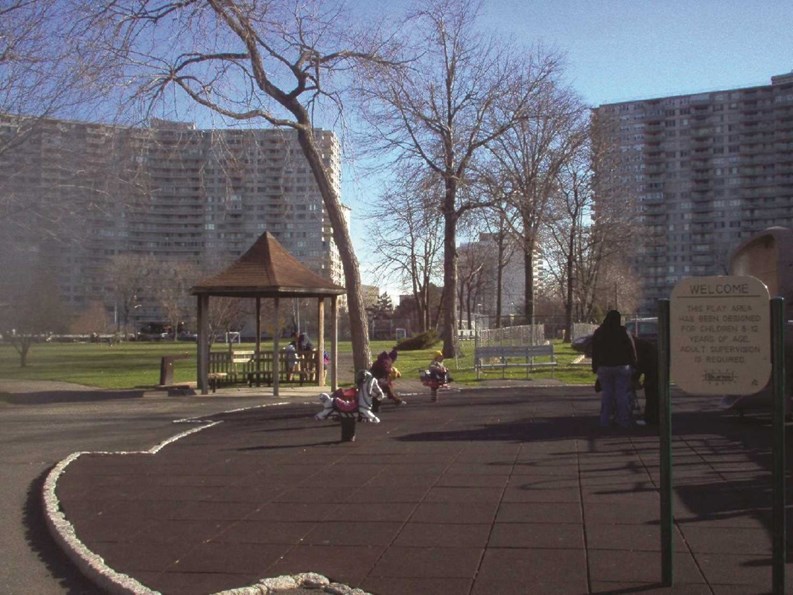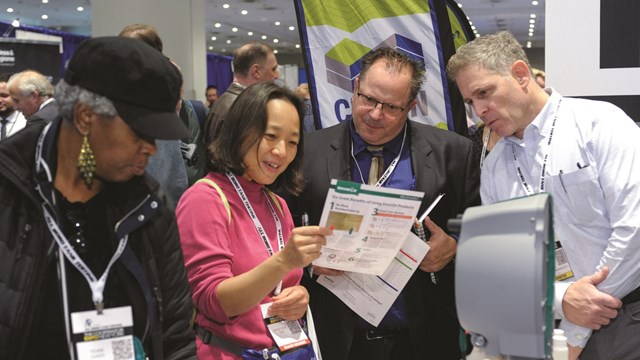What do you do when you live in a community overloaded with traffic going to and from the George Washington Bridge where many HOA owners are overtaxed?
The membership of the Fort Lee Cooperative & Condominium Association (FLCCA) decided to create a group that would act as a voice for condo and co-op owners in the borough of Fort Lee.
The association started in 2000 with six buildings. According to the group’s literature, “The need for an association to represent the interests of co-op shareholders and condo owners became apparent at the start of the new century because of Fort Lee’s unique composition. Just about 60 percent of the borough’s occupied housing units are contained in co-op and condo high rises and [townhouse] communities.”
Membership and Mission
The association’s membership consists of 17 buildings and townhouse communities. Twelve of those HOAs are co-ops (of the 18 total in Fort Lee) and five are condos (out of 23 with at least 50 units in the borough). The association estimates that about 60 percent of Fort Lee’s housing units exist in co-op and condo communities.
Membership in the FLCCA is available to any HOA in Fort Lee with at least 50 units. Building boards appoint representatives to attend meetings and vote. Dues are $500 per year.
One reason for the creation of the FLCCA is the sheer number of co-ops in Fort Lee. The FLCCA claims that 40 percent of the borough’s HOAs are co-ops, a larger percentage than any other municipality in New Jersey.
Its stated mission is to “protect and improve the financial well-being and quality of life of the shareholders, owners and residents who live in the borough’s high rise buildings and [townhouse] communities.” Among its areas of primary concern are apportionment of real estate taxes, land use, zoning, traffic, parking, population density and other issues that impact the finances and quality of life of the borough’s HOA residents.
One need the FLCCA aims to fill is to represent Fort Lee’s senior citizen population, many of whom spend their winters in warmer climates.
“We do have an older population,” says Marvin J. Rothenberg, secretary/ treasurer for the association. “What we have, my guess would be, is a larger proportion of snowbirds than most other towns have. That’s one of the reasons a lot of people come here into the high rises, so that they don’t have to maintain a home while they live in Florida several months out of the year.” Because of that, many Fort Lee homeowners aren’t around when important decisions are made. The FLCCA acts as a voice for those residents.
Michael Kaplan is the executive director of the FLCCA and the president of The Plaza, a membership building where Rothenberg is the corporate secretary. Kaplan was initially named interim executive director of the FLCCA after the previous executive director, Arthur Levine was elected to the Fort Lee school board (the association’s bylaws prevent public office holders from serving as officers,) before fully assuming the position.
Directing Traffic
One of the association’s primary concerns is traffic in the borough. Kaplan and Rothenberg say traffic has been an issue in Fort Lee for 50 years. Rothenberg adds that he’s researched and found articles dating back to 1991 quoting candidates for the borough’s board promising to address the problem, but nothing seems to happen.
A complicating factor is that the roads drivers use in Fort Lee to get to the George Washington Bridge are mostly county or state roads, or are controlled by the Port Authority.
Two major routes to bridge, 80 and 4, bisect through Fort Lee. “If those roads are tied up, [drivers] get off and use the local roads to try to get to the bridge,” Rothenberg says. The traffic woes have gotten worse in recent years as nearby Edgewater has become a haven for young people who commute into Manhattan. Ferry service in Edgewater started earlier this year, but so far it hasn’t made any noticeable difference in traffic, says Rothenberg, adding that any relief is welcome.
All of this congestion means Fort Lee has to have an unusually large police force (more than 100 officers for 37,000 residents), that the borough pays for itself.
“There may not be anything we can do about the physical traffic that goes to the bridge, but the state and the county and the Port Authority are not helping to pay for the unusual number of police that we have to have,” Kaplan says.
To address the traffic problem, the FLCCA borrows a phrase from Taco Bell, suggesting to “Think outside the bun.” The association suggested creating a commission between the state, county, borough and Port Authority to determine if it would be possible to redesign Fort Lee’s streets to better-control traffic and relieve Fort Lee’s taxpayers from an unfair burden.
“The majority of our traffic is bridge-related and so many of our streets are not in [Fort Lee’s] domain,” the association’s literature states. Rothenberg also brings up his concern that Mayor Michael R. Bloomberg’s congestion pricing plan may further add to the already troublesome traffic in Fort Lee. The congestion plan is anticipated to charge $8 for cars and $21 for trucks entering Manhattan below 60th Street on weekdays between 6 a.m. and 6 p.m. Rothenberg expects that this additional toll could bring commuters that would ordinarily take the Holland Tunnel into Manhattan, through Fort Lee in order to take the George Washington Bridge and park above the toll zone.
The Centuria Situation
The planned Centuria development, is a mixed-use community to be built on 16 acres of property that was known as the Helmsley property. The redevelopment according to the development firm, will contain high-rise and mid-rise luxury condominiums, a five-star hotel, upscale retailers, a conference center, Class A office space and parking for 2,900 cars.
According to Rothenberg, the property was deemed to be an area in need of redevelopment by the borough, and Town and Country, a Clifton developer, was hired to construct it. The initial concerns amongst the association that Fort Lee officials hadn’t done enough homework regarding the project, have been corroborated by frequent setbacks and stalls in the project, most notably a recent revelation that the redevelopment project is now delinquent $175,000 in tax payments.
“One of the problems that we have is that all the information we get from the borough is nothing but a rehash of the publicity that Town and Country puts out,” Rothenberg says. “And we feel that since Town and Country was able to bet this property… because of the borough’s action, the borough has a responsibility to get in and find out the truth, and not just use what the developer tells them.”
The association also believes that Centuria will make Fort Lee’s traffic problems even worse.
“We think all of those people are going to be commuters, which means none of the rest of us will ever see the George Washington Bridge for the rest of our lives,” Kaplan says.
A Taxing Situation
Another big issue for the association is the taxation of co-op buildings. Co-ops in New Jersey are taxed in the same manner as residential properties and condos, based on the assessed value which is essentially related to sale prices. However, co-ops are classifed with rental apartment buildings, on the form the Tax Assessor sends to Trenton. Rothenberg’s guess is that this is done because co-ops pay one tax bill through the management office, unlike in condos, where each unit owner is sent a tax bill.
“The difference, of course, is unlike apartments, a co-op’s taxes are apportioned back to the shareholders based on the number of shares they hold,” Rothenberg says. “Probably the other reason is that, technically, we, as shareholders are leasing our units from the corporation.”
Rothenberg calls this classification method “bureaucratic hogwash,” and adds that [the state is] looking at the legalities rather than facts. Our assessed value is determined exactly the same way as that of condos.”
The result, though, appears to be short changing Fort Lee on the amount of state aid received for municipal tax relief. Since almost 40% of the housing units are in co-ops and co-ops are not on the “residential” line on which that portion of aid appears to be based, Fort Lee’s taxpayers are not receiving the relief that they should be getting.
Kaplan adds that in some ways, the state has acknowledged that co-op owners are, indeed, individual real estate taxpayers.
“New Jersey has a tax rebate program for people who make less than $250,000,” he says. “They give our shareholders the rebate just as if they were owners.”
Both claim that they’ve contacted various officials about this issue, including the Department of Community Affairs, and haven’t gotten a response. A reason for this may be that there just aren’t many co-ops in New Jersey, even though Fort Lee has quite a few.
“My guess is that outside of New York City, we probably have more co-ops than any place in the country,” Rothenberg says.
Looking Past, and Into the Future
Issues the association has tackled successfully in the past include negotiating a bulk cable contract for member buildings where residents get a discount rate, including getting Showtime at no extra charge.
In 2006, the association discovered an error in Fort Lee’s salary ordinance 2006-47 listing a salary schedule through 2009 for the department heads of the municipality. The borough council’s finance chairperson acknowledged that the association found a “serious error,” adding that the ordinance would be corrected in January 2007, and later it was announced that an independent auditor would be hired to review the ordinance.
Looking to the future, the FLCCA wants to promote open government, communicate with residents of member buildings, and keep an eye on issues such as the Centuria project, traffic, real estate taxes, and state aid. It would also like to look into creating an organization representing condos and co-ops in Fort Lee, Edgewater and Cliffside Park, all of which are in the same legislative district. While many of Fort Lee’s government representatives (including the mayor and some council members) live in member buildings, Rothenberg and Kaplan say they aren’t active in the FLCCA. Some active members are running for office in the next election.
The association believes that many of these concerns are pertinent to all residents of Fort Lee, not just residents of HOAs. In fact, Rothenberg says that a few individual homeowners in the borough have inquired about joining the association.
“What we’re after would not only help people who live in the high rises, but the homeowners as well,” Rothenberg says. “Taxes, traffic, these are issues that concern everyone in Fort Lee.
Anthony Stoeckert is a freelance writer and a frequent contributor toThe New Jersey Cooperator.





2 Comments
Leave a Comment